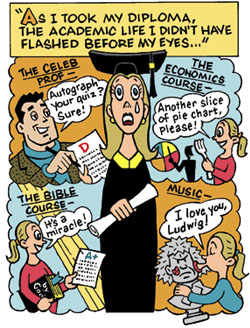
 May
15, 2002: On
the Campus
May
15, 2002: On
the Campus
The
Princeton that wasn’t
A
graduating senior reflects on opportunities missed
By Kristen Albertsen ’02
What’s a senior to do once the thesis is subdued inside a deceptively innocent faux-leather binding? The two to three courses typical of a senior spring course load (totaling from six to 12 hours of classes per week) barely fill the time after the months of 60-hour work weeks punctuated by a dozen all-nighters. I admit it: I find myself wistfully scrolling through the online course catalog for this spring and next fall, dreaming of all the courses I would like to take or wish I had taken during my four years here at the university.
Some seniors I know strove to take courses with as many of the famous professors at Princeton as possible, regardless of their department or subject matter (or, for that matter, actual skill in teaching). Students who applied to the creative writing program coveted the seminars led by professors Joyce Carol Oates, John McPhee ’53, and Paul Muldoon (we all learned early on freshman year that a course with Toni Morrison was about as likely as a fall football bonfire to celebrate victories over Harvard and Yale – possible in theory, but woefully rare in practice). Others sought a brush with greatness in history (professors James McPherson and Anthony Grafton), economics (Alan Blinder ’67 and Elizabeth Bogan), English (Elaine Showalter and John Fleming), or politics or bioethics (Robert George and Peter Singer). Still others satisfied less traditional interests in the classics (Robert Fagles) or film (P. Adams Sitney). To be sure, taking courses with such professors secures cocktail-party bragging rights, but what’s more significant is interacting with such influential scholars on a personal level. The experience of having dinner at Professor Grafton’s house, knowing and sharing Professor Sitney’s quirky brand of humor, or having Professor Singer comment directly on one’s written work is unparalleled. Furthermore, the opportunity to speak with such thinkers on matters outside their academic expertise – subjects ranging from contemporary events to university policy to The Simpsons – is liberating, as is the simple realization that such brilliant minds are people too, and not so different from the students they teach.
But my nascent academic nostalgia for Princeton goes beyond the professors. Like many people, I wish I had taken a few more courses outside my discipline. My father, Peter Albertsen ’74, was a biochemistry major and always talks about his fortunate decision to take Music Appreciation his senior spring. While I don’t think I, a comparative literature major, could go so far as to take Organic Chemistry, I wish I could have had time for Music 103. My liberal arts education is similarly deficient because I took neither Classical Mythology nor The Bible in the Western Tradition, courses that are both highly applicable to my study of literary allusions and to my general base of knowledge.
It isn’t only more literature courses with which I would have stuffed my schedule, either; I never got around to taking either Economics 101 or 102, and am now regretting that I know all about French neoclassicist poetry and nothing about the GNP.
Despite the many dozens of missed opportunities, however, I guess I
feel pretty lucky. Not only do I plan to go on to graduate school, but
instead of feeling burned out after four years, I feel invigorated. My
list of books to read continually grows, and there are plenty of self-taught
or summer courses through which to learn a fourth foreign language. As
for studying up on the stock market and GNP, I suppose there is always
the notorious black and yellow Economics for Dummies — Princeton
dummies, that is, who missed the opportunity to take the course the first
time around. ![]()
Kristen Albertsen ’02, a comparative literature major from Simsbury, Connecticut, has been PAW’s intern since her sophomore year and this year wrote Comparative Life, a PAW Online column. We at PAW wish her the best of luck in her post-Princeton career — we’ll miss her.
PAW ONLINE:
Playing the prospective game: Liriel Higa ’02 on recruiting undergraduates,
On the Campus Online.
